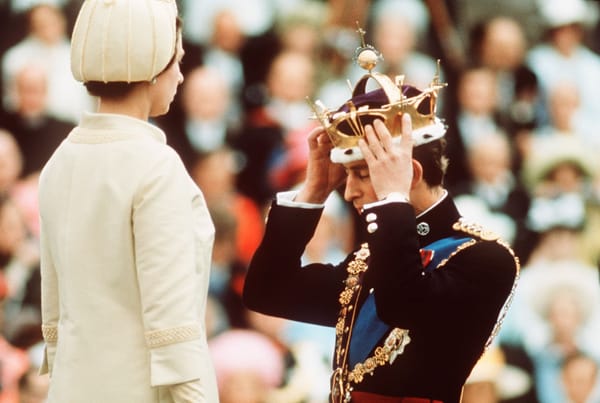The coronation of King Charles III on Saturday will look all right to most people. But it won’t be all right. I wish it were otherwise, but I have long feared that my country no longer has the confidence to acclaim a king, and I think it will not quite come off this time. There are too few serious monarchists left at all, and far too few under the age of 60. Like it or not, approve or not, regard it as sexist if you wish, but pronouncing the words “God Save the King!” is somehow more definite and challenging than it has been to say—as we have done for 70 years—“God Save the Queen!” The very sound of the word “king” contains a challenge and an assertion to those who don’t like such things, stronger than the sound of the word “queen.”
Each week in church, I am startled when the rector, who follows the proper Prayer Book largely dating from the age of Elizabeth I, beseeches the Almighty to “behold our most sovereign Lord, King Charles; and so replenish him with the grace of thy Holy Spirit, that he may always incline to thy will, and walk in thy way.” This is part of the stately and moving “Prayer for the King’s Majesty,” which (I am sorry to say) most Church of England clergy long ago ceased to use—and in some cases may not even be aware of. For all but the first 15 months of my life, this has been the “Prayer for the Queen’s Majesty,” and I can’t get used to its change of sex, despite many months of hearing it. More importantly I wonder if the whole thing is now in danger. You can maintain all kinds of institutions on the basis of habit and custom. But when the time comes round for renewal, things can get awkward.
Why should you care? I will explain that shortly. But in modern Britain, and in the United States, huge numbers of otherwise thoughtful people dismiss monarchy as a faintly embarrassing tourist show, a bejeweled soap opera, a childish dressing-up game, a survivor of the childhood of humanity that ought decently to be laid to rest. They think that its end is inevitable (after all, hasn’t everyone else got rid of it, always a powerful argument when dealing with the brisk and efficient?). And they point out that it has been sustained these many years by the late Queen’s personal popularity, which departed with her and which poor Charles hasn’t inherited. Its standard-issue defenders respond by trundling out the dust-shrouded works of the unpronounceable Walter Bagehot, with his dull thoughts about the “dignified” and “efficient” bits of our constitution, and his not-very-original warning that we shouldn’t let daylight in upon magic.
Well, and so what? The behavior of so many members of the royal family has been so embarrassing in recent decades that there is precious little dignity left to go round. The new king, who likes to think of himself as a religious traditionalist, has even so somehow found himself married to a woman with a living husband, which (whatever you may have heard to the contrary) is still not allowed by the Church of England, whose supreme governor he is. This fact is so dismaying that it is thought impolite to mention it, but there it is. As for daylight, the British monarchy nowadays submits itself to spotlights, TV studio lights, flash photography, you name it, as bright as they can get.
